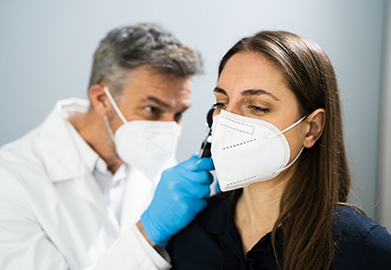What’s The Connection Between Hearing Loss and COVID-19?


COVID-19 has been shown to cause both short-term and long-term complications to those who have been infected. These include damages to organs such as the lungs, heart and several neurological complications.
However, there is something unique about the coronavirus. The infection has been linked to hearing problems for some patients as an immediate symptom or a complication after the initial infection. This leaves many hearing specialists trying to figure out the connection between COVID-19 and hearing loss.
We do know that many infections can cause sudden hearing loss. However, previous strains of coronaviruses, including the one responsible for the SARS outbreak from 2002-2004, did not cause hearing problems. So what is different about the current strain that causes it to affect hearing?
COVID-19 Can Reduce Blood Oxygen
The two most observed symptoms of COVID-19 are low blood oxygen (hypoxemia) levels and difficulty breathing. The delicate organs in your inner ear, particularly the cochlear hair cells, require good blood oxygenation to function correctly. Without proper blood flow, you can begin to experience hearing issues such as tinnitus, balance problems, and hearing loss.
Once you begin to recover from COVID-19, your blood oxygen levels can take some time to return to normal. This is why you may still experience hearing loss even once you begin to feel better.
Coronavirus May Cause Damage to The Inner Ear
Although there is little published information on this, experts believe that coronavirus can cause structural damage to the inner ear organs and nervous system. This is similar to other viral infections such as measles, which have been shown to cause ear infections and nerve swelling.
Some individuals diagnosed with COVID-19 but were otherwise asymptomatic still experienced hearing loss and showed signs that the outer hair cell function had been affected by the illness.
Sudden Hearing Loss as an Initial COVID-19 Symptom
Generally, sudden hearing loss would not lead you to believe you have COVID-19. However, some individuals with no symptoms of the virus experienced a sudden loss of hearing and tested positive for coronavirus.
While it is not a guaranteed connection, there is enough evidence to indicate that COVID-19 is a possible cause of sudden hearing loss. In any case, sudden hearing loss should be considered a medical emergency requiring urgent attention.
Hearing Loss as a Later Symptom
Though still relatively rare, some patients develop hearing loss, tinnitus, or dizziness later in the infection. This can occur several days or weeks after the onset of other coronavirus symptoms.
According to a study by the International Journal of Audiology, 14.8% of adults who had COVID-19 showed symptoms of tinnitus, 7.6% had hearing loss, and 7.2% experienced vertigo.
A Case Study of Coronavirus and Hearing Loss
In October of 2020, BMJ Case Reports released a study on a 45-year-old COVID-19 patient in the UK. He had a previous diagnosis of asthma, which caused severe coronavirus symptoms, and he was hospitalized. While in the hospital, he complained of hearing loss in one ear. As his symptoms became worse, he was placed on a ventilator and received IV steroid medications, antivirals, and a blood transfusion. Finally, he recovered, and the hospital was able to remove his breathing tube.
Nearly a week after the tube was removed, he again experienced ringing in his left ear and sudden hearing loss. He was seen by ear specialists who did not find any physical causes such as inflammation or a blockage. However, when a hearing test was conducted, it showed that he had lost most hearing in the affected ear. Through treatment using steroid tablets and injections, his hearing was partially restored.
Ototoxicity of COVID-19 Treatments
Some antiviral medications used to treat COVID-19 are ototoxic, meaning they have a toxic effect on the ear or ear nerve. This can result in hearing loss, among other ear problems. Some of the antivirals that are known to have ototoxic properties include Favipiravir and Remdesivir.
These medications are known to cause issues such as tinnitus. Unfortunately, Remdesivir and steroid therapy are the most used early treatments for coronavirus patients who have pre-existing respiratory problems, which may lead to an increase in patients experiencing hearing problems.
Staying Safe to Prevent Hearing Problems
From the information gathered since the onset of the pandemic, it is safe to say that there is some connection between hearing loss and the coronavirus.
As this virus still maintains a widespread presence around the world, it is important to learn more about the effects it can have on hearing. If you experience problems, talking to a hearing specialist as soon as possible can help reduce the risk of permanent damage. With enough research, it is possible to improve our treatment methods or prevent hearing issues related to coronavirus.
Visit Bravo Hearing for Quick & Reliable Hearing Loss Assistance
At Bravo Hearing, we offer testing, support, and recommendations for individuals experiencing hearing loss. In addition, our team of hearing loss specialists can help you understand your condition and suggest hearing aids or repair your devices so you can enjoy better hearing.
As an essential service in Ontario, we are able to remain open through any phase of the lockdowns. To protect our patients and staff, we have put measures in place to reduce contact when possible as we assist you with hearing problems. Our team wears full PPE, and we limit the number of patients allowed in the hearing clinic at one time.
If you would like to visit us, we request that you schedule an appointment before coming to the clinic. Additionally, we ask that you adhere to the safety guidelines, including wearing masks, social distancing, and sanitizing your hands. We look forward to safely offering you the best hearing services in Toronto!
Also Read:
Hearing Aid Service Protocol During COVID-19
How to Stay Connected with Hearing Aids During COVID-19
Useful Care and Cleaning Tips for Hearing Aids During COVID-19


